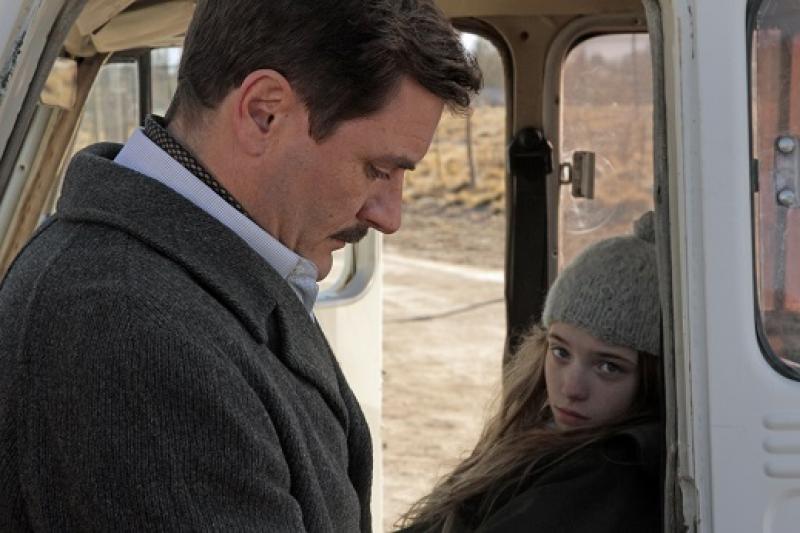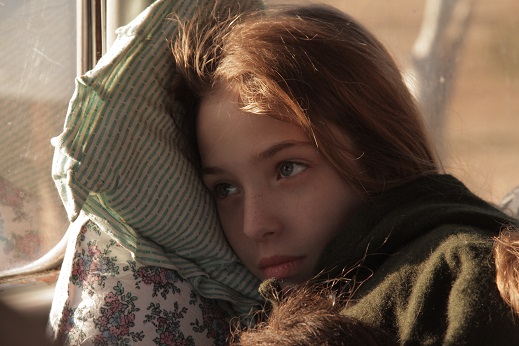Wakolda | reviews, news & interviews
Wakolda
Wakolda
Confident Argentinian drama mixes thriller elements with darker themes

Against the background of the spectacular scenery of Patagonia, Argentinian director Lucia Puenzo creates a tight, subtly unnerving thriller in her third film Wakolda. Its American release title “The German Doctor” reveals its subject more immediately, which is the time spent by Nazi physician Josef Mengele (Alex Brendemuhl) in Latin America after his flight from Europe.
But Wakolda is a very long way indeed from the other film that springs to mind on that subject, The Boys from Brazil. Instead it tells a chamber story of how Brendemuhl’s character, travelling under the name Helmut Gregor, insinuates himself into an Argentinian family, when the stunted physique of the daughter Lilith (Florencia Bado) draws his professional interest. Equally unnerving is the portrayal of the German-speaking community in remote Patagonia, Nazi-sympathizing well before World War Two and never purged of it, now honoured to shelter one of that regime’s most notorious figures. (Mengele went to Argentina in 1949, and spent the rest of his life in various South American countries until he died in Brazil in 1979: he was never apprehended.)
Puenzo handles the thriller elements subtly, slowly nurturing a sense of closing-in
Set in 1960, the film opens with Mengele hurrying away from Buenos Aires: news of the appearance of Nazi-hunters (who would soon track down and capture another Nazi refugee, Eichmann) is in the air. He’s heading south for the remote town of Bariloche, where he’s expected. On the long and perilous road, he falls into the company of an Argentinian family on their way to reopen a family hotel that’s set in spectacular mountain landscapes on the banks of a lake. The place becomes the main location for Puenzo’s drama, its natural beauty (so very like Switzerland, as is remarked more than once), established in stark contrast to Mengele’s dark intentions. Even in this natural paradise there’s a snake of suspicion though, with seaplanes frequently landing on the lake to drop off mysterious passengers at a nearby clinic.
 Puenzo is a director of considerable assurance, who treats her story – the source is the novel written by the director herself – with persuasive detail. Lilith’s premature birth has left her short for her age, and the doctor persuades her parents that he can treat her – the mother Eva (Natalia Oreiro) is easily convinced, while father Enzo (Diego Peretti) remains suspicious. Enzo’s sideline is making and repairing dolls, and a subplot brings him into business with Mengele’s assistance, thus earning his consent.
Puenzo is a director of considerable assurance, who treats her story – the source is the novel written by the director herself – with persuasive detail. Lilith’s premature birth has left her short for her age, and the doctor persuades her parents that he can treat her – the mother Eva (Natalia Oreiro) is easily convinced, while father Enzo (Diego Peretti) remains suspicious. Enzo’s sideline is making and repairing dolls, and a subplot brings him into business with Mengele’s assistance, thus earning his consent.
Mengele’s interest, as before in the concentration camps, is physical form, investigating the possibilities for improving or perfecting the race, achieving the concept of sonnenmenschen, or supermen, as it’s referenced in the film. The first time he sees Lilith he notes her as a “perfect specimen”, later meticulously recording his medical studies in annotated notebooks. The dolls become a metaphor too, with the contrast of Lilith’s rough, hand-made one (that doll’s name gives the film its title) and the anonymous porcelain perfection of the factory-produced examples (Alex Brendemuhl with dolls, pictured below left).

Puenzo balances, with great poise, that central psychological attachment against the surrounding world depicted, particularly the details of the local German-speaking community, one that's somehow detached both in language (the film switches freely between Spanish and German) and in time, clearly still caught up with the discredited ideology of two decades earlier. She handles the thriller elements subtly, slowly nurturing a sense of closing-in, of growing urgency towards a dramatic conclusion. Set against this interior drama are the film's unforgettable landscapes, the towering mountains and rough deserts of the huge country which are spectacularly captured in Nicolas Puenzo's widescreen cinematography. It’s a compelling combination, pulled off by Lucia Puenzo with great accomplishment.
Overleaf: watch the trailer for Wakolda
rating
Share this article
The future of Arts Journalism
You can stop theartsdesk.com closing!
We urgently need financing to survive. Our fundraising drive has thus far raised £33,000 but we need to reach £100,000 or we will be forced to close. Please contribute here: https://gofund.me/c3f6033d
And if you can forward this information to anyone who might assist, we’d be grateful.

Subscribe to theartsdesk.com
Thank you for continuing to read our work on theartsdesk.com. For unlimited access to every article in its entirety, including our archive of more than 15,000 pieces, we're asking for £5 per month or £40 per year. We feel it's a very good deal, and hope you do too.
To take a subscription now simply click here.
And if you're looking for that extra gift for a friend or family member, why not treat them to a theartsdesk.com gift subscription?
more Film
 The Accountant 2 review - belated return of Ben Affleck's lethal bean-counter
Horror, humour and mind games combine in Gavin O'Connor's sequel
The Accountant 2 review - belated return of Ben Affleck's lethal bean-counter
Horror, humour and mind games combine in Gavin O'Connor's sequel
 The Ugly Stepsister review - gleeful Grimm revamp
A cutting Norwegian take on Cinderella and her adversaries
The Ugly Stepsister review - gleeful Grimm revamp
A cutting Norwegian take on Cinderella and her adversaries
 April review - powerfully acted portrait of a conflicted doctor in eastern Georgia
Dea Kukumbegashvili's second film is stylistically striking and emotionally raw
April review - powerfully acted portrait of a conflicted doctor in eastern Georgia
Dea Kukumbegashvili's second film is stylistically striking and emotionally raw
 theartsdesk Q&A: filmmaker Miguel Gomes on his latest exotic opus, 'Grand Tour'
The Portuguese director's comic melodrama takes a fantastical journey through Southeast Asia and the history of cinema
theartsdesk Q&A: filmmaker Miguel Gomes on his latest exotic opus, 'Grand Tour'
The Portuguese director's comic melodrama takes a fantastical journey through Southeast Asia and the history of cinema
 Neil Young: Coastal review - the old campaigner gets back on the trail
Young's first post-Covid tour documented by Daryl Hannah
Neil Young: Coastal review - the old campaigner gets back on the trail
Young's first post-Covid tour documented by Daryl Hannah
 The Penguin Lessons review - Steve Coogan and his flippered friend
P-p-p-pick up a penguin... few surprises in this boarding school comedy set in Argentina during the coup
The Penguin Lessons review - Steve Coogan and his flippered friend
P-p-p-pick up a penguin... few surprises in this boarding school comedy set in Argentina during the coup
 Blue Road: The Edna O'Brien Story - compelling portrait of the ground-breaking Irish writer
Glitz and hard graft: Sinéad O'Shea writes and directs this excellent documentary
Blue Road: The Edna O'Brien Story - compelling portrait of the ground-breaking Irish writer
Glitz and hard graft: Sinéad O'Shea writes and directs this excellent documentary
 DVD/Blu-ray: In a Year of 13 Moons
UK disc debut for Fassbinder's neglected, tragic, tender trans tale
DVD/Blu-ray: In a Year of 13 Moons
UK disc debut for Fassbinder's neglected, tragic, tender trans tale
 The Amateur review - revenge of the nerd
Remi Malek's computer geek goes on a cerebral killing spree
The Amateur review - revenge of the nerd
Remi Malek's computer geek goes on a cerebral killing spree
 Holy Cow review - perfectly pitched coming-of-age tale in rural France
Debut feature of immense charm with an all-amateur cast
Holy Cow review - perfectly pitched coming-of-age tale in rural France
Debut feature of immense charm with an all-amateur cast
 Patrick McGilligan: Woody Allen - A Travesty of a Mockery of a Sham review - New York stories
Fair-minded Woody Allen biography covers all bases
Patrick McGilligan: Woody Allen - A Travesty of a Mockery of a Sham review - New York stories
Fair-minded Woody Allen biography covers all bases

Add comment